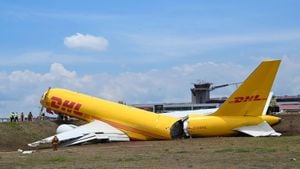A rocket being tested at a new British spaceport located in the Shetland Islands has experienced a catastrophic explosion on the launch pad.
This incident unfolded during tests by Germany’s Rocket Factory Augsburg (RFA) and happened just before the rocket was set to be launched.
Onlookers were left horrified when the rocket encountered what was described as an "anomaly," which ignited a massive fireball on the launchpad.
Filmed footage captured from a safe distance revealed the explosion engulfing the entire rocket, sending flames and sparks shooting outwards.
Fortunately, the mishap did not result in any injuries, but the sheer scale of the event left many shocked.
Smoke was seen billowing high above the SaxaVord Spaceport, following the explosion of the rocket engine.
An RFA spokesperson confirmed the calamity, stating, "On Monday evening, RFA conducted a hot fire of its first stage at their launch site. This resulted in an anomaly leading to the loss of the stage."
Despite the chaotic scene, the spokesperson reassured the public by adding, "No one was injured, and the launch pad is secured with the situation under control."
RFA has initiated its own probe to examine the circumstances surrounding the incident, acknowledging the inherent risks integrated with testing stages.
They expressed confidence, noting, "We develop iteratively with an emphasis on real testing, and our goal is to return to regular operations as soon as possible."
The test was part of RFA’s broader strategy, where the company plans to engage aggressively with rigorous testing to refine its technology.
SaxaVord Spaceport, situated on Unst—one of the northernmost islands of the Shetlands—had previously seen success with its initial tests back in May of this year.
Despite this setback, the site remains poised to play a significant role in European space endeavors, aiming to become the first Western European place to launch satellites and rockets vertically.
With approval from the Civil Aviation Authority, the spaceport is on track to facilitate up to 30 payload launches each year.
A spokesperson for the SaxaVord Spaceport echoed this sentiment, pointing out, "This was just part of the testing process. These campaigns are intended to identify issues before advancing to the next stage."
They also expressed readiness to support RFA as they digest the findings and advance their preparations for future launches.
This explosion is just one part of the larger narrative surrounding the transformation of space exploration activities within the UK and beyond.
Given the increasing number of players entering the aerospace sector, rigorous evaluations have become the cornerstone of their success.
RFA's commitment to testing reflects the vibrant yet unforgiving nature of the burgeoning space industry, where each failure serves as both recovery and learning point.
Each test will inform RFA’s designs and lead to safer rocket technology as they work to capitalize on the explosive growth of the commercial space sector.
This recent event at SaxaVord Spaceport highlights the high-stakes environment of rocket launches and the intense scrutiny they entail.
It is evident the aerospace sector will continue to be challenged by such hurdles as it seeks to expand operations and capabilities.
Analysts speculate whether such incidents could impact public perception of space exploration and the confidence investors place within these new ventures.
While the immediate aftermath is under review, long-term strategies will need to be assessed and possibly recalibrated to reinforce safety protocols.
The lessons gathered from this setback may prove invaluable for future missions and contribute significantly to building trust within the community.
With space travel gaining momentum globally, firms like RFA are racing to keep up and meet growing demands, which now includes improving safety measures.
Despite past challenges, the vision for the future of space exploration remains unwavering as both private and governmental entities forge their paths forward.
New partnerships among space agencies and companies could lay the groundwork for increasingly ambitious missions.
Watching how companies react to and recover from setbacks like this one can set the tone for the broader narrative of space exploration.



